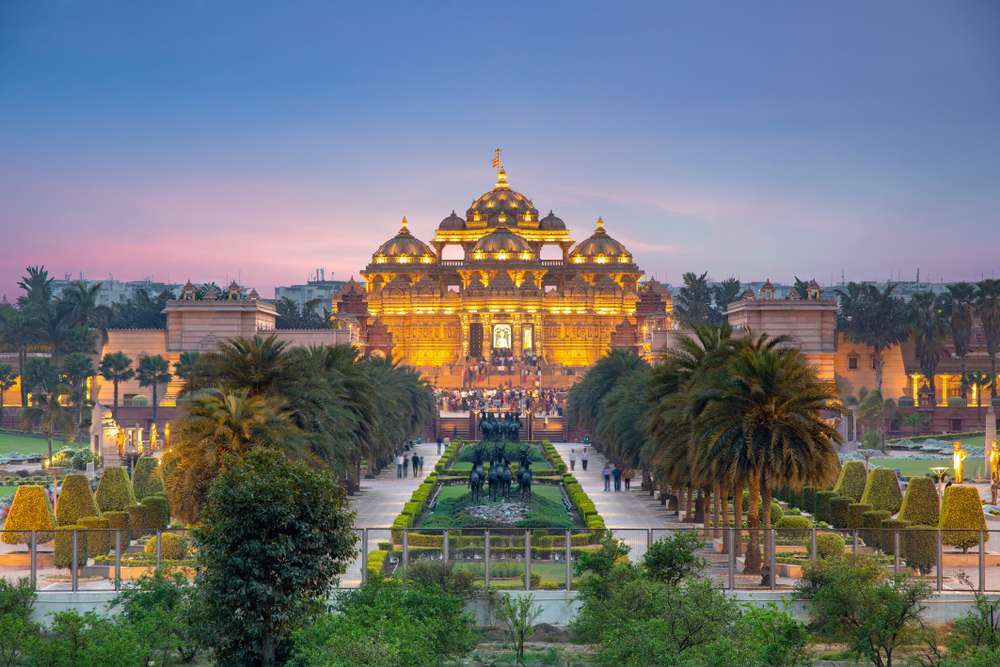India, the world’s largest democracy, stands as a testament to the vitality and dynamism of the democratic process. With a population of over 1.3 billion people, the complexity and diversity within the nation are immense, making the democratic experiment in India a truly fascinating and evolving journey. In this article, we will explore the roots of India’s democratic process, its evolution over the years, and the challenges it faces as it seeks to represent and serve such a vast and diverse populace.
INDIAN VISA FOR ZIMBABWEAN CITIZENS
Historical Foundations of India’s Democratic Process
The roots of democratic governance in India can be traced back to ancient times, with references to assemblies and councils known as “Sabhas” and “Samitis.” The concept of participatory decision-making and representation is deeply ingrained in Indian society, showcasing a historical understanding of governance based on the collective will of the people. The Mauryan and Gupta empires had systems in place that resembled early democratic structures. The concept of “Dharma,” which encompassed the principles of ethical governance, laid the foundation for a just and fair society, emphasizing participation and accountability.
Post-Independence: Birth of the Republic of India
India gained independence from British rule on August 15, 1947. The freedom struggle, led by figures like Mahatma Gandhi, Jawaharlal Nehru, and Sardar Patel, was instrumental in shaping the democratic ideals of the nation. The Constituent Assembly of India, under the leadership of Dr. B.R. Ambedkar, drafted the Indian Constitution, which came into effect on January 26, 1950. The Constitution established India as a democratic republic, guaranteeing fundamental rights to all citizens, regardless of caste, creed, religion, or gender. It laid the foundation for a multi-tiered democratic system, with a President, a bicameral legislature, an independent judiciary, and a federal structure.
The Federal Structure: States and Union Territories
India’s federal structure divides governance responsibilities between the central government and various states and union territories. The powers and functions of the central and state governments are demarcated in the Constitution to ensure the smooth functioning of the democratic process. India follows a parliamentary system, with elected representatives at both the national and state levels. The states and union territories have their legislatures and executives to address regional concerns while being an integral part of the larger democratic framework.
Elections: The Backbone of India’s Democracy
Elections are the cornerstone of India’s democratic process. The country conducts elections at regular intervals to elect representatives at various levels of governance. These include Lok Sabha (lower house of Parliament) elections, state legislative assembly elections, and local body elections. The Election Commission of India, an independent constitutional authority, oversees the conduct of elections to ensure fairness, transparency, and the active participation of the electorate. The electoral system in India is based on a first-past-the-post system, where the candidate with the highest number of votes wins.
Political Parties: A Pluralistic Landscape
India boasts a vibrant and diverse political landscape, with numerous political parties representing different ideologies, regions, and communities. The Indian National Congress (INC) and the Bharatiya Janata Party (BJP) are two of the major national parties, but there are several regional parties that play a crucial role in the democratic process. Coalition politics is common, especially at the national level, where multiple parties join hands to form a government. This plurality reflects India’s diverse society and ensures that the democratic process is inclusive and representative of the various interests and opinions present within the country.
INDIAN VISA FOR AUSTRIAN CITIZENS
Challenges and Evolving Dynamics
India’s democratic process, while robust and multifaceted, faces numerous challenges. One significant challenge is the issue of political corruption and criminalization of politics. Efforts are underway to tackle this problem, including electoral reforms, increased transparency, and stringent regulations. Another challenge is socio-economic disparity, which impacts the democratic process by influencing the electoral outcomes and representation. Bridging this divide through inclusive policies and economic growth is crucial for a more effective and equitable democratic framework. Furthermore, ensuring the active participation of women, youth, and marginalized communities in the democratic process is an ongoing challenge. Steps are being taken to encourage their involvement through reservations, awareness campaigns, and educational initiatives.
Conclusion
India’s democratic process remains a dynamic and evolving experiment, adapting to the changing needs and aspirations of its citizens. With a rich historical foundation and a diverse populace, India’s democracy has shown resilience and vitality over the years. While challenges persist, the democratic ethos, a vibrant civil society, and a robust judiciary provide hope for a brighter democratic future. Through continued efforts to address challenges, promote inclusivity, and strengthen democratic institutions, India aims to ensure that its democratic experiment remains a shining beacon in the global arena.
Read more: India’s Top 10 Foodie Cities: Where To Find The Best Food In India

Traveling to India was an unforgettable experience, filled with vibrant colors, rich traditions, and warm hospitality. From the bustling streets of Delhi to the serene backwaters of Kerala, every moment was a cultural immersion. The diversity in cuisine, languages, and festivals was truly awe-inspiring, making it a unique destination that touches the soul.
Also read:
https://dropyournote.com/natures-paradise-exploring-the-beautiful-beaches-of-the-usa/
https://dropyournote.com/investing-in-the-usa-why-its-a-great-place-for-your-next-business-venture/
https://workouthiit.com/the-best-american-cities-for-outdoor-enthusiasts/
https://workouthiit.com/career-growth-in-the-usa-industries-on-the-rise-and-how-to-get-started/
https://writerpaper.com/americas-national-parks-a-journey-through-breathtaking-landscapes/
https://writerpaper.com/top-5-cities-in-the-usa-for-tech-startups-thriving-hubs-of-innovation/
https://buyeditor.com/exploring-the-natural-beauty-of-yellowstone-national-park/
https://buyeditor.com/the-best-business-schools-in-the-usa-a-comprehensive-guide/
https://expertlivejournal.com/sightseeing-in-washington-d-c-from-the-national-mall-to-the-smithsonian/
https://expertlivejournal.com/the-best-wildlife-sanctuaries-in-the-usa-for-animal-lovers/
https://writervalley.com/exploring-saudi-arabias-natural-wonders-a-guide-to-the-most-beautiful-desert-landscapes/
https://writervalley.com/top-10-scenic-road-trips-across-saudi-arabia-for-nature-lovers/
https://findyoureditor.com/the-best-places-to-see-the-sunset-in-saudi-arabia/
https://findyoureditor.com/unlocking-business-opportunities-in-saudi-arabias-growing-tech-industry/
https://ewriterzone.com/how-to-start-a-business-in-saudi-arabia/
https://ewriterzone.com/traveling-through-saudi-arabia-must-see-destinations-from-riyadh-to-jeddah/
https://hurryupwriter.com/the-ultimate-guide-to-hiking-in-saudi-arabias-mountains/
https://hurryupwriter.com/career-opportunities-in-saudi-arabia-high-demand-jobs-and-growing-industries/
https://objectlive.com/discovering-the-charm-of-saudi-arabias-small-towns-and-villages/
https://objectlive.com/top-sightseeing-spots-in-riyadh-from-kingdom-centre-to-al-masmak-fortress/
https://dropyournote.com/exploring-indias-natural-wonders-a-guide-to-the-most-beautiful-national-parks/
https://dropyournote.com/top-10-scenic-road-trips-across-india-for-nature-lovers/
https://workouthiit.com/the-best-places-to-see-the-sunrise-in-india/
https://workouthiit.com/unlocking-business-opportunities-in-indias-growing-tech-industry/
https://writerpaper.com/how-to-start-a-business-in-india-a-step-by-step-guide-for-entrepreneurs/
https://writerpaper.com/traveling-through-india-must-see-destinations-from-north-to-south/
https://buyeditor.com/the-ultimate-guide-to-trekking-in-the-indian-himalayas/
https://buyeditor.com/career-opportunities-in-india-high-demand-jobs-and-growing-industries/
https://expertlivejournal.com/discovering-the-charm-of-indias-small-towns-and-villages/
https://expertlivejournal.com/top-sightseeing-spots-in-delhi-from-india-gate-to-qutub-minar/
https://writervalley.com/natures-paradise-exploring-the-beautiful-beaches-of-new-zealand/
https://writervalley.com/investing-in-new-zealand-why-its-a-great-place-for-your-next-business-venture/
https://findyoureditor.com/the-best-new-zealand-cities-for-outdoor-enthusiasts/
https://findyoureditor.com/career-growth-in-new-zealand-industries-on-the-rise-and-how-to-get-started/
https://ewriterzone.com/new-zealands-national-parks-a-journey-through-breathtaking-landscapes/
https://ewriterzone.com/top-5-cities-in-new-zealand-for-tech-startups/
https://hurryupwriter.com/exploring-the-natural-beauty-of-fiordland-national-park/
https://hurryupwriter.com/the-best-business-schools-in-new-zealand-a-comprehensive-guide/
https://objectlive.com/sightseeing-in-wellington-from-te-papa-museum-to-zealandia/
https://objectlive.com/the-best-wildlife-sanctuaries-in-new-zealand-for-animal-lovers/
https://dropyournote.com/natures-paradise-exploring-the-beautiful-beaches-of-goa/
https://dropyournote.com/investing-in-india-why-its-a-great-place-for-your-next-business-venture/
https://workouthiit.com/the-best-indian-cities-for-outdoor-enthusiasts/
https://workouthiit.com/career-growth-in-india-industries-on-the-rise-and-how-to-get-started/
https://writerpaper.com/indias-national-parks-a-journey-through-breathtaking-landscapes/
https://writerpaper.com/top-5-cities-in-india-for-tech-startups/
https://buyeditor.com/exploring-the-natural-beauty-of-keralas-backwaters/
https://buyeditor.com/the-best-business-schools-in-india-a-comprehensive-guide/
https://expertlivejournal.com/sightseeing-in-mumbai-from-marine-drive-to-the-gateway-of-india/
https://expertlivejournal.com/the-best-wildlife-sanctuaries-in-india-for-animal-lovers/
https://writervalley.com/natures-paradise-exploring-the-beautiful-beaches-of-turkeys-turquoise-coast/
https://writervalley.com/investing-in-turkey-why-its-a-great-place-for-your-next-business-venture/
https://findyoureditor.com/the-best-turkish-cities-for-outdoor-enthusiasts/
https://findyoureditor.com/career-growth-in-turkey-industries-on-the-rise-and-how-to-get-started/
https://ewriterzone.com/turkeys-national-parks-a-journey-through-breathtaking-landscapes/
https://ewriterzone.com/top-5-cities-in-turkey-for-tech-startups/
https://hurryupwriter.com/exploring-the-natural-beauty-of-pamukkales-travertine-terraces/
https://hurryupwriter.com/the-best-business-schools-in-turkey-a-comprehensive-guide/
https://objectlive.com/sightseeing-in-ankara-from-ataturks-mausoleum-to-the-old-quarter/
https://objectlive.com/the-best-wildlife-sanctuaries-in-turkey-for-animal-lovers/
https://dropyournote.com/exploring-canadas-natural-wonders-a-guide-to-the-most-beautiful-national-parks/
https://dropyournote.com/top-10-scenic-road-trips-across-canada-for-nature-lovers/
https://workouthiit.com/the-best-places-to-see-the-northern-lights-in-canada/
https://workouthiit.com/unlocking-business-opportunities-in-canadas-booming-tech-industry/
https://writerpaper.com/how-to-start-a-business-in-canada-a-step-by-step-guide-for-entrepreneurs/
https://writerpaper.com/traveling-through-canada-must-see-destinations-from-coast-to-coast/
https://buyeditor.com/the-ultimate-guide-to-hiking-in-the-canadian-rockies/
https://buyeditor.com/career-opportunities-in-canada-high-demand-jobs-and-growing-industries/
https://expertlivejournal.com/discovering-the-charm-of-canadas-small-towns-and-villages/
https://expertlivejournal.com/natures-paradise-exploring-the-beautiful-beaches-of-canadas-east-coast/
https://writervalley.com/emerging-business-hubs-in-india-cities-you-should-know-about/
https://writervalley.com/a-travel-guide-to-rajasthan-history-culture-and-scenery/
https://findyoureditor.com/career-opportunities-in-indias-healthcare-industry/
https://findyoureditor.com/discovering-the-beauty-of-indias-andaman-and-nicobar-islands/
https://ewriterzone.com/indias-top-cities-for-young-professionals/
https://ewriterzone.com/unforgettable-road-trips-exploring-the-beauty-of-the-indian-wilderness/
https://hurryupwriter.com/how-to-navigate-the-indian-job-market-as-a-newcomer/
https://hurryupwriter.com/the-best-ski-resorts-in-india-for-an-unforgettable-winter-vacation/
https://objectlive.com/exploring-the-business-landscape-in-indias-major-cities/
https://objectlive.com/the-top-historical-sites-to-visit-in-india-for-history-buffs/
https://dropyournote.com/top-10-scenic-road-trips-across-vietnam-for-nature-lovers/
https://dropyournote.com/indias-beautiful-hill-stations-perfect-getaways-in-the-mountains/
https://workouthiit.com/the-booming-e-commerce-sector-in-india-opportunities-and-trends/
https://workouthiit.com/the-growing-renewable-energy-sector-in-canada-business-opportunities-and-trends/
https://writerpaper.com/a-travel-guide-to-the-canadian-maritimes-history-culture-and-scenery/
https://writerpaper.com/career-opportunities-in-canadas-healthcare-industry/
https://buyeditor.com/discovering-the-beauty-of-canadas-pacific-rim-national-park-reserve/
https://buyeditor.com/a-journey-through-indias-most-scenic-train-routes/
https://expertlivejournal.com/career-opportunities-in-indias-renewable-energy-sector/
https://expertlivejournal.com/exploring-the-ancient-temples-of-south-india-a-spiritual-journey/
https://writervalley.com/emerging-business-hubs-in-turkey-cities-you-should-know-about/
https://writervalley.com/a-travel-guide-to-ephesus-ancient-ruins-and-historical-wonders/
https://findyoureditor.com/career-opportunities-in-turkeys-healthcare-industry/
https://findyoureditor.com/discovering-the-beauty-of-turkeys-princes-islands/
https://ewriterzone.com/turkeys-top-cities-for-young-professionals/
https://ewriterzone.com/unforgettable-road-trips-exploring-the-beauty-of-turkeys-countryside/
https://hurryupwriter.com/how-to-navigate-the-turkish-job-market-as-a-newcomer/
https://hurryupwriter.com/the-best-ski-resorts-in-turkey-for-an-unforgettable-winter-vacation/
https://objectlive.com/exploring-the-business-landscape-in-turkeys-major-cities/
https://objectlive.com/the-top-historical-sites-to-visit-in-turkey-for-history-buffs/